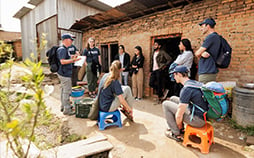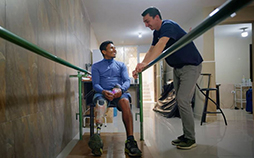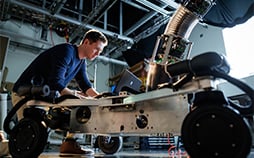Researching the Effects of Air Pollution in Nepal
An interdisciplinary BYU research team traveled to Nepal to measure brick workers’ exposure to pollutants and to assess their respiratory health.
August 2024
True story: since the 1960s, engineering students across the country have been building concrete canoes to test their engineering excellence and hydrodynamic design skills. Naturally, they started racing them, and now it’s a thing. A big thing.
This summer, concrete canoe races sanctioned by the American Society of Civil Engineers (ASCE) came to BYU for the 37th annual competition. More than 500 civil engineering students and faculty from 50 colleges and universities came to campus and gathered at Utah Lake to show off and then race their hopefully seaworthy concrete canoes.
The University of Florida team won the Concrete Canoe Competition. BYU’s five-person team, along with its 358-pound concrete canoe named “The Mustang,” finished in the middle of the pack. Earlier this year, the BYU team had taken third place in the regional competition.
The team from West Point won the Spirit of the Competition Award for swimming to the finish line when their canoe sank. The West Point students swam 300 meters, towing their swamped canoe, while the rest of the competitors cheered them on with chants of “U-S-A!”
Canoe racing was one of three ASCE competitions held in Provo. The other competitions were focused on sustainability and surveying. BYU students Taylor Miskin and Adam Hill organized all three competitions and the overall experience—something they have been planning for two years.
Miskin says that the people he interacted with were impressive, and he felt that the real-life engineering and team dynamic skills he learned would be beneficial.
The team from Georgia Tech took first place in sustainable solutions, and the Purdue University Northwest team took home the prize in surveying.
Brian Blumer of the BYU Ira A. Fulton College of Engineering says, “Taylor and Adam pulled this off in true-blue fashion.”

An interdisciplinary BYU research team traveled to Nepal to measure brick workers’ exposure to pollutants and to assess their respiratory health.

BYU students and Prótesis Imbabura work to make more affordable prosthetics for people in Ecuador.

Students in the BYU Robotics and Dynamics Lab are making robots that do the heavy lifting.